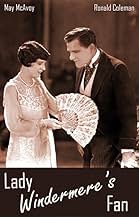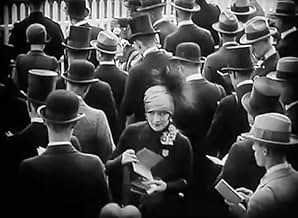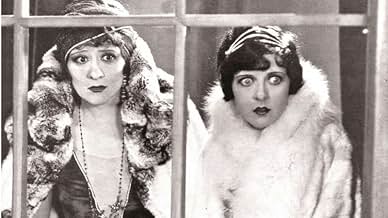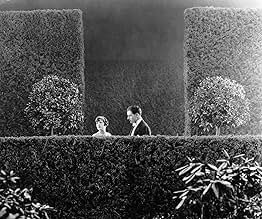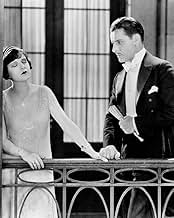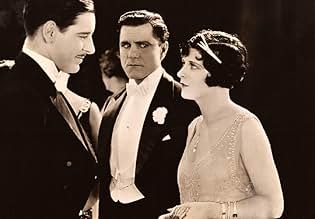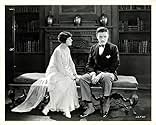NOTE IMDb
7,2/10
1,5 k
MA NOTE
Une femme mondaine croit que son mari la trompe, une méprise qui pourrait avoir des conséquences désastreuses pour tous les protagonistes.Une femme mondaine croit que son mari la trompe, une méprise qui pourrait avoir des conséquences désastreuses pour tous les protagonistes.Une femme mondaine croit que son mari la trompe, une méprise qui pourrait avoir des conséquences désastreuses pour tous les protagonistes.
- Réalisation
- Scénario
- Casting principal
- Récompenses
- 1 victoire au total
Edward Martindel
- Lord Augustus Lorton
- (as Edw. Martindel)
Carrie Daumery
- The Duchess of Berwick
- (as Mme. Daumery)
Billie Bennett
- Lady Plymdale
- (non crédité)
Michael Dark
- Party Guest
- (non crédité)
Helen Dunbar
- Mrs. Cowper-Cowper
- (non crédité)
Frank Finch Smiles
- Waiter with Party Guest List
- (non crédité)
Larry Steers
- Party Guest
- (non crédité)
Ellinor Vanderveer
- Party Guest
- (non crédité)
Percy Williams
- Waiter at the Party
- (non crédité)
Avis à la une
Perhaps only Ernst Lubitsch could have created this masterpiece, a play by one of the world's greatest users of words turned into a silent motion picture.
I remember seeing this at the late and very lamented Silent Movie Theatre on Fairfax in Los Angeles, in the 1970s. And I remember marveling then how Lubitsch was able to create such a magnificent work.
Yes, he had the help of superlative actors -- May McAvoy's performance was truly a revelation -- and of course had the basic Wilde play as well as Julien Josephson's adaption, but it's his camera placement and where the actors performed that make this such a wonder.
I cannot recommend too strongly this "Lady Windermere's Fan," but when you go to YouTube, be careful to check out the various editions before you settle down to watch. One is terrible, but the one I saw is great. Worthy of a great movie.
I remember seeing this at the late and very lamented Silent Movie Theatre on Fairfax in Los Angeles, in the 1970s. And I remember marveling then how Lubitsch was able to create such a magnificent work.
Yes, he had the help of superlative actors -- May McAvoy's performance was truly a revelation -- and of course had the basic Wilde play as well as Julien Josephson's adaption, but it's his camera placement and where the actors performed that make this such a wonder.
I cannot recommend too strongly this "Lady Windermere's Fan," but when you go to YouTube, be careful to check out the various editions before you settle down to watch. One is terrible, but the one I saw is great. Worthy of a great movie.
Ernst Lubitsch was a great director with many wonderful films, his early work (his German silents) is more interesting than great but when he hit his stride from the late-20s onwards his very distinctive directing style sparkled at its best. Oscar Wilde was a tremendously influential, perceptive and subversive writer, his work having much drollness and bite. Have for a long time appreciated silent films highly, while there are ones that don't hold up the ones that have are very good and the best landmarks.
'Lady Windermere's Fan' is an interesting Wilde play. It is not one of my favourite works of his, 'The Importance of Being Ernest', 'The Selfish Giant' and 'The Picture of Dorian Grey' connect with me more and am more familiar with them too, but it is unmistakably Wilde in characterisation and prose. This 1925 film adaptation is great on its own terms and even if Lubitsch went on to do even better later 'Lady Windermere's Fan' is by far one of his best and most interesting silent films (and to me one of his first great films).
Don't expect a film that is one hundred percent faithful to the source material. As said, there is a lot of heavy re-working. Not that that is a bad thing, it makes no difference to me actually, but it is merely a word of warning for anybody that thinks the opposite. It also feels more Lubitsch than Wilde, which is not necessarily a bad thing. Absolutely love Lubitsch's directing style, very much in full display, which is full of wit, sophistication and irony.
While Wilde's typically perceptive depiction of humanity and its nature and the insightful approach to his characters remain, there isn't quite enough of his own wit and subversiveness. There is absolutely evidence of them and the two styles generally don't clash surprisingly, but Lubitsch's directing makes more of a splash here.
Visually, 'Lady Windermere's Fan' looks great. Very sumptuously designed and costumed and there are some stylish shots that are expansive enough to avoid it from feeling too much of a filmed play or too claustrophobic. Lubitsch's direction is clever and elegant throughout, no rough around the edges feel or any signs of disinterest. It is very well performed and with more subtlety than a fair share of silent films from this period, with the best performance coming from Irene Rich as the most interesting character. She really does lighten up the screen.
All the conflicts are done with tension but also in a witty and sophisticated fashion, and the actors interact very naturally, no stiffness or disconnection here. The story is fun and charming, any harshness in the conflict done with bite and nuance. It goes at a lively enough pace, helped by that Lubitsch doesn't take the material too seriously, and doesn't get bogged down by staginess or over-reliance on anything that could potentially deaden the pace (i.e. title cards). The characters are interesting and Wilde's perceptive approach towards them is maintained.
On the whole, great. 9/10
'Lady Windermere's Fan' is an interesting Wilde play. It is not one of my favourite works of his, 'The Importance of Being Ernest', 'The Selfish Giant' and 'The Picture of Dorian Grey' connect with me more and am more familiar with them too, but it is unmistakably Wilde in characterisation and prose. This 1925 film adaptation is great on its own terms and even if Lubitsch went on to do even better later 'Lady Windermere's Fan' is by far one of his best and most interesting silent films (and to me one of his first great films).
Don't expect a film that is one hundred percent faithful to the source material. As said, there is a lot of heavy re-working. Not that that is a bad thing, it makes no difference to me actually, but it is merely a word of warning for anybody that thinks the opposite. It also feels more Lubitsch than Wilde, which is not necessarily a bad thing. Absolutely love Lubitsch's directing style, very much in full display, which is full of wit, sophistication and irony.
While Wilde's typically perceptive depiction of humanity and its nature and the insightful approach to his characters remain, there isn't quite enough of his own wit and subversiveness. There is absolutely evidence of them and the two styles generally don't clash surprisingly, but Lubitsch's directing makes more of a splash here.
Visually, 'Lady Windermere's Fan' looks great. Very sumptuously designed and costumed and there are some stylish shots that are expansive enough to avoid it from feeling too much of a filmed play or too claustrophobic. Lubitsch's direction is clever and elegant throughout, no rough around the edges feel or any signs of disinterest. It is very well performed and with more subtlety than a fair share of silent films from this period, with the best performance coming from Irene Rich as the most interesting character. She really does lighten up the screen.
All the conflicts are done with tension but also in a witty and sophisticated fashion, and the actors interact very naturally, no stiffness or disconnection here. The story is fun and charming, any harshness in the conflict done with bite and nuance. It goes at a lively enough pace, helped by that Lubitsch doesn't take the material too seriously, and doesn't get bogged down by staginess or over-reliance on anything that could potentially deaden the pace (i.e. title cards). The characters are interesting and Wilde's perceptive approach towards them is maintained.
On the whole, great. 9/10
At first it might not seem as if the combination of Ernst Lubitsch and Oscar Wilde would work very well, but this silent-screen adaptation of Wilde's "Lady Windermere's Fan" is both enjoyable and well-crafted. Instead of clashing, Lubitsch's stylish, mischievous approach and Wilde's perceptive cynicism complement each other. The characters and the story are Wilde's, the acting and the style are Lubitsch's.
Although the material is heavily re-worked from the original play, Lubitsch's decisions all seem to work pretty well. Wilde's witty and resourceful dialogue is gone, but his insightful portrayals of human nature remain. Lubitsch also makes good use of the camera to bring off some shots that could not have worked on the stage. In particular, at times he makes the fateful fan seem almost a full-fledged part of the cast.
This movie version features solid performances by May McAvoy and Bert Lytell as the Windermeres, with a youngish-looking Ronald Colman suitably ingratiating as Lord Darlington. But Irene Rich has the most interesting character, and as Mrs. Erlynne she also gives a fine performance that particularly stands out in her scenes with the other characters. She and Lubitsch both capture the nature of her unpopular but admirable character, while carefully setting up the contrasts and conflicts between her and the other characters, who are in general more socially acceptable but far less worthy.
This also works well simply as an entertaining, often very amusing, and sometimes dramatically compelling story. For most silent film fans, it would definitely be worth tracking down and watching.
Although the material is heavily re-worked from the original play, Lubitsch's decisions all seem to work pretty well. Wilde's witty and resourceful dialogue is gone, but his insightful portrayals of human nature remain. Lubitsch also makes good use of the camera to bring off some shots that could not have worked on the stage. In particular, at times he makes the fateful fan seem almost a full-fledged part of the cast.
This movie version features solid performances by May McAvoy and Bert Lytell as the Windermeres, with a youngish-looking Ronald Colman suitably ingratiating as Lord Darlington. But Irene Rich has the most interesting character, and as Mrs. Erlynne she also gives a fine performance that particularly stands out in her scenes with the other characters. She and Lubitsch both capture the nature of her unpopular but admirable character, while carefully setting up the contrasts and conflicts between her and the other characters, who are in general more socially acceptable but far less worthy.
This also works well simply as an entertaining, often very amusing, and sometimes dramatically compelling story. For most silent film fans, it would definitely be worth tracking down and watching.
When a stage play is turned into a movie the results can be dire, especially when the play is a dialog-driven comedy of manners, full of quips and epigrams. Unless it's handled carefully even a great play might come off as 'canned' and lifeless on screen, amounting to little more than what Alfred Hitchcock dismissed as "photographs of people talking." A few exceptions come to mind: The Philadelphia Story, the two versions of Holiday made in the '30s, the Rex Harrison/Margaret Rutherford Blithe Spirit, and a handful of other stage-to-screen adaptations that manage to be lively and entertaining despite heavy reliance on dialog. But these films are surpassed in achievement, in one sense at least, by an adaptation from 1925 which perfectly captures the spirit of the play it presents while scarcely quoting it!
Before seeing Ernst Lubitsch's silent version of Lady Windermere's Fan at the Museum of Modern Art this summer I re-read Oscar Wilde's play, which I enjoyed, but I didn't have high hopes for the movie, despite the involvement of a director I count among my favorites. I imagined the movie would consist of actors standing around in tuxes and evening gowns pretending to mouth witty sayings, which would then be presented to us in numerous title cards; but because I admire Lubitsch's sound films a great deal I thought I'd give it a try. Plus, I thought it'd be interesting to see Ronald Colman in a silent film, deprived of that wonderful voice. What a pleasant surprise to find that this is one of the best sophisticated comedies of the silent screen. The flavor of Wilde's play is distilled to its essence, and clearly conveyed without relying on a single one of his famous epigrams. (Interestingly, a recent biography of Lubitsch says that the film quotes only two or three lines from the play, but if so I didn't catch them.) How is this possible?
Lubitsch conveys Wilde's notions about high society swells and their prejudices cinematically, not verbally. When the notorious Mrs. Erlynne (Irene Rich) appears at the Ascot race track, the reaction of "society" is quickly made clear to us by the scandalized facial expressions of the ladies present; who, nonetheless, can't stop looking at her or talking about her. The tone of their remarks is obvious from their sour expressions. Naturally, the men are interested in Mrs. Erlynne, too. She is shown, montage fashion, from many different angles, through lorgnettes and binoculars, long-shot, extreme long-shot and close-up, and while the horse race is reduced to mere background. It's a funny and informative sequence, yet it isn't in Wilde's play at all. In another scene that more closely follows the text, Lord Darlington (Colman) calls on Lord and Lady Windermere at their home. He is formally announced, and pretends briefly that he actually came to see Lord Windermere on some minor matter. But when Windermere conveniently leaves on business, Darlington, shown in a stately long-shot, strides away from Lady Windermere (May McAvoy), sits, shoots her a sly look, and announces that he is in love with her. Shocked, she crosses and drops into a chair next to him. He rises, crosses away from her, and drops into a different chair. They both look miserable. Fade-out. It's a beautifully staged scene, and no additional dialog is necessary.
Another sequence that occurs late in the film perfectly epitomizes the famous Lubitsch Touch while deftly conveying the spirit of Wilde's play: a title card announces that "The relations between a man and a woman can be told by the way he presses her doorbell." Various ways in which this is so are then demonstrated. You wouldn't think that a close-up shot of a doorbell and a gentleman's gloved hand could be so suggestive, but Lubitsch manages to suggest a great deal.
The black & white cinematography of Lady Windermere's Fan positively shimmers; happily, this is one silent film that has been well preserved. The acting is quite restrained by the standards of the day, and even without his voice Ronald Colman has the presence of a star, while Irene Rich gives the performance of her career. It's a wonderful adaptation of a great play that can stand on its own as cinema; and it may come as a surprise to those who believe silent film comedy begins and ends with Ben Turpin and the Keystone Cops.
Before seeing Ernst Lubitsch's silent version of Lady Windermere's Fan at the Museum of Modern Art this summer I re-read Oscar Wilde's play, which I enjoyed, but I didn't have high hopes for the movie, despite the involvement of a director I count among my favorites. I imagined the movie would consist of actors standing around in tuxes and evening gowns pretending to mouth witty sayings, which would then be presented to us in numerous title cards; but because I admire Lubitsch's sound films a great deal I thought I'd give it a try. Plus, I thought it'd be interesting to see Ronald Colman in a silent film, deprived of that wonderful voice. What a pleasant surprise to find that this is one of the best sophisticated comedies of the silent screen. The flavor of Wilde's play is distilled to its essence, and clearly conveyed without relying on a single one of his famous epigrams. (Interestingly, a recent biography of Lubitsch says that the film quotes only two or three lines from the play, but if so I didn't catch them.) How is this possible?
Lubitsch conveys Wilde's notions about high society swells and their prejudices cinematically, not verbally. When the notorious Mrs. Erlynne (Irene Rich) appears at the Ascot race track, the reaction of "society" is quickly made clear to us by the scandalized facial expressions of the ladies present; who, nonetheless, can't stop looking at her or talking about her. The tone of their remarks is obvious from their sour expressions. Naturally, the men are interested in Mrs. Erlynne, too. She is shown, montage fashion, from many different angles, through lorgnettes and binoculars, long-shot, extreme long-shot and close-up, and while the horse race is reduced to mere background. It's a funny and informative sequence, yet it isn't in Wilde's play at all. In another scene that more closely follows the text, Lord Darlington (Colman) calls on Lord and Lady Windermere at their home. He is formally announced, and pretends briefly that he actually came to see Lord Windermere on some minor matter. But when Windermere conveniently leaves on business, Darlington, shown in a stately long-shot, strides away from Lady Windermere (May McAvoy), sits, shoots her a sly look, and announces that he is in love with her. Shocked, she crosses and drops into a chair next to him. He rises, crosses away from her, and drops into a different chair. They both look miserable. Fade-out. It's a beautifully staged scene, and no additional dialog is necessary.
Another sequence that occurs late in the film perfectly epitomizes the famous Lubitsch Touch while deftly conveying the spirit of Wilde's play: a title card announces that "The relations between a man and a woman can be told by the way he presses her doorbell." Various ways in which this is so are then demonstrated. You wouldn't think that a close-up shot of a doorbell and a gentleman's gloved hand could be so suggestive, but Lubitsch manages to suggest a great deal.
The black & white cinematography of Lady Windermere's Fan positively shimmers; happily, this is one silent film that has been well preserved. The acting is quite restrained by the standards of the day, and even without his voice Ronald Colman has the presence of a star, while Irene Rich gives the performance of her career. It's a wonderful adaptation of a great play that can stand on its own as cinema; and it may come as a surprise to those who believe silent film comedy begins and ends with Ben Turpin and the Keystone Cops.
Nobody was as savvy about the intricacies of the human heart as Lubitsch, and of how virtue is never an absolute.
This warmly empathetic, highly sophisticated gem is an adaptation of Oscar Wilde, with virtually none of the play's dialog utilized, but as suggestive and outrageous as Wilde himself, conceived, framed and edited as pure cinema.
From the exact same period as Cecil B. DeMille's infinitely more crass sex comedies and Charles Chaplin's equally brilliant and morally ambiguous 'The Woman of Paris', but carried by an indistinguishably European sensibility. Irene Rich as the woman who sacrifices herself in secret is impossibly glamorous and subtle, May McAvoy is truly heartbreaking as the socialite suspicious of her husband's philandering, but Ronald Colman, alas, is left with nothing much to do except smolder sexily at the fringes with those impertinently raised eyebrows.
A highlight is the Ascot game, a marvel of choreography and mime, a delicious baiting of upper class hypocrisy.
This warmly empathetic, highly sophisticated gem is an adaptation of Oscar Wilde, with virtually none of the play's dialog utilized, but as suggestive and outrageous as Wilde himself, conceived, framed and edited as pure cinema.
From the exact same period as Cecil B. DeMille's infinitely more crass sex comedies and Charles Chaplin's equally brilliant and morally ambiguous 'The Woman of Paris', but carried by an indistinguishably European sensibility. Irene Rich as the woman who sacrifices herself in secret is impossibly glamorous and subtle, May McAvoy is truly heartbreaking as the socialite suspicious of her husband's philandering, but Ronald Colman, alas, is left with nothing much to do except smolder sexily at the fringes with those impertinently raised eyebrows.
A highlight is the Ascot game, a marvel of choreography and mime, a delicious baiting of upper class hypocrisy.
Le saviez-vous
- AnecdotesOne of the 50 films in the three-disk boxed DVD set called "More Treasures from American Film Archives, 1894-1931" (2004), compiled by the National Film Preservation Foundation from five American film archives. This film is preserved by the Museum of Modern Art, has a running time of 89 minutes and an added piano music score.
- Citations
Opening title card: Lady Windermere faced the grave problem of seating her dinner guests.
- ConnexionsFeatured in Historia del cine: Epoca muda (1983)
Meilleurs choix
Connectez-vous pour évaluer et suivre la liste de favoris afin de recevoir des recommandations personnalisées
- How long is Lady Windermere's Fan?Alimenté par Alexa
Détails
- Date de sortie
- Pays d’origine
- Langue
- Aussi connu sous le nom de
- Lady Windermere's Fan
- Lieux de tournage
- Toronto, Ontario, Canada(Racetrack Scene)
- Société de production
- Voir plus de crédits d'entreprise sur IMDbPro
Box-office
- Budget
- 320 000 $US (estimé)
- Durée
- 2h(120 min)
- Mixage
- Rapport de forme
- 1.33 : 1
Contribuer à cette page
Suggérer une modification ou ajouter du contenu manquant

